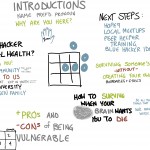There is an interesting phenomena I learned about in my first quarter of social work school.
When we start keeping track of behaviors, without any other intervention aside from keeping track, we start to experience change in the direction we desire.
This is one of the ideas behind “quantified self,” a movement to keep track of everything from sleep/wake patterns to heart rate to mood to spending habits. If you keep track of your exercise, food intake, and body measurements, or if you’ve ever assigned a number to your “sense of satisfaction” every day for days in a row, you’re doing “quantified self.” Keep a journal of medications and your mood? Quantified self. Even something like a daily check list of activities can be quantified self if you retain the data.
Quantified self also comes out of a rational scientific mindset of inductive reasoning. We collect data and see what patterns we observe. When patterns start to emerge, we then have the option of testing them through more or less rigid adherence to the scientific method. I say “more or less rigid” because it is incredibly difficult to maintain constants and make only one change at a time in the course of our individual, day-to-day lives.
However, quantified self can be incredibly useful to track changes when starting or stopping a medication. It can also be helpful to notice the more subtle effects of exercise over time. Bringing in data to your health care provider can be incredibly useful. If your provider is worth their salt, they will appreciate the attempts to narrow down variables and notice any patterns. (Side note: I once had a provider who, upon seeing my months of sleep charting in the attempt to find patterns related to wicked insomnia, decided I should be diagnosed with obsessive-compulsive disorder. We didn’t work together very long.)
Want to start getting at whether that 2pm cup of coffee really helps you wake up in the afternoon or if it makes it harder to fall asleep at night? Here’s an extensive (and I mean really, really extensive) list of tools, many of which you could use right on your phone or laptop.
Some tips and tricks?
- Keep it simple. The more elaborate your recording system, the more likely you will feel you don’t have the energy to “write it all down.”
- Keep it accessible. On your mobile device right there in front. On your bedside table so you remember to do it last thing at night or first thing in the morning.
- Set an alert or alarm. Or use a recurring task to remind you to record your data. Unless you are recording “triggered event” data (logging every cup of coffee every time you drink it), it can be really easy to forget to make your entry.
- Don’t let the perfect get in the way of the good. If you are anything like me, you might want to spend a lot of time setting up a system that’s going to be “just right.” Pick something simple and start with it. Same goes for days of missing data. There are going to be holes in your data set. That’s just the way it goes. This doesn’t make your data worthless.
- Get inspired by others. Check out the community over at Quantified Self or attend a local meetup to see how others are using the concept of quantified self to get solid results improving their quality of life.
